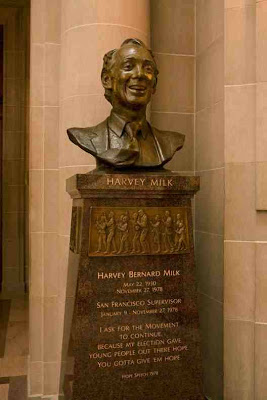
The Harvey Milk shrine gracing the top of San Francisco City Hall's grand staircase has an inscription from the late supervisor's famed speech claiming his election "gave young people out there hope. You gotta give 'em hope."
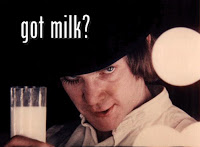 Hope clearly is fast gaining steam in some quarters now that this new & improved milk propaganda blitz has hit the stratosphere. Last Tuesday California Gov. Schwarzenegger followed Pres. Obama's lead in deifying the Jim Jones accomplice, with the signing into state law "Harvey Milk Day" every May 22nd. This comes on the heels of Governor Musclehead's plan to induct the Milk Man into the California Hall of Fame in December.
Hope clearly is fast gaining steam in some quarters now that this new & improved milk propaganda blitz has hit the stratosphere. Last Tuesday California Gov. Schwarzenegger followed Pres. Obama's lead in deifying the Jim Jones accomplice, with the signing into state law "Harvey Milk Day" every May 22nd. This comes on the heels of Governor Musclehead's plan to induct the Milk Man into the California Hall of Fame in December.That next side show will follow the month after another Jonestown Massacre anniversary, which Harvey also gets a bow for being one of the preventable tragedy's most notable official facilitators.
Sure, there's some folks that continue taking issue with me here, some of them who just can't resist playing apologists for all the brazen allies of the torturers & murderers that ran the People's Temple cult. One of my readers, "Emily," wrote in earlier this year (and PLEASE do excuse me for letting some of the comments fall through the cyber cracks!) pleading compassion for the self-serving slobs, living and dead, who have Jonestown blood-stained hands.
Emily, an apparent fan of fictional bio-pics, set the record straight about the "Milk" movie:
"Come on.
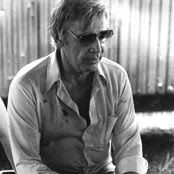 Even Ryan himself was initially fooled by the supposed utopian socialist paradise while he was standing within its very walls. Jones was a masterful con man and was very, very deft at appearing kind to outsiders. Even initial criticisms and reports of abuse could have been disputed as a disgruntled or intolerant agenda against what, from the outside, very easily could have appeared to be nothing more than a loving group of people committed to a self-sustaining lifestyle apart from the real world.
Even Ryan himself was initially fooled by the supposed utopian socialist paradise while he was standing within its very walls. Jones was a masterful con man and was very, very deft at appearing kind to outsiders. Even initial criticisms and reports of abuse could have been disputed as a disgruntled or intolerant agenda against what, from the outside, very easily could have appeared to be nothing more than a loving group of people committed to a self-sustaining lifestyle apart from the real world.Yes, you and I know that was far, far from the case now, but we have history on our side. It's very easy to sit back in judgement when you know what was going to happen next.
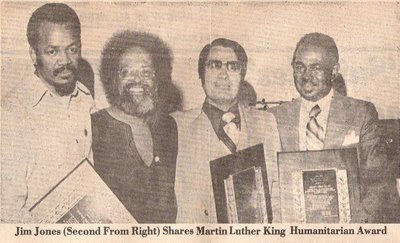 Do you honestly think any of those people would have been complacent and done nothing if they had hard, factual evidence that there was extreme abuse that would result in everybody in Jonestown being killed? Do you think nobody feels any guilt for being a part of what ultimately enabled Jones to get away with it all?
Do you honestly think any of those people would have been complacent and done nothing if they had hard, factual evidence that there was extreme abuse that would result in everybody in Jonestown being killed? Do you think nobody feels any guilt for being a part of what ultimately enabled Jones to get away with it all?The movie is about Harvey Milk and his activism for gay civil rights, not Harvey Milk and everybody he ever knew in his lifetime. Introducing the Jones aspect would have been an almost awkward non sequitur that couldn't have been done in a manner that would do the severity of the subject justice, unless you made the entire film about that association. It's the stuff of dense biographies, not a two-hour biopic. Simply brushing over the subject as if it were not important would have been worse than not mentioning it at all.
A lot of people were fooled by Jim Jones. I can't condemn every last one of them for not knowing the horrific fate of his followers."
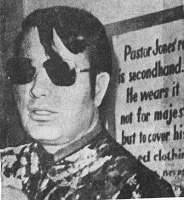 Emily, it looked like it was cinch for Harvey Milk to sing the cult praises as a "loving group of people committed to a self-sustaining lifestyle apart from the real world," just as long as he (A) kept on getting their invaluable election support and (B) averted his eyes to the continuing avalanche of substantiated reports of Temple fraud, abuse, slave labor, beatings, extortion, and death drills.
Emily, it looked like it was cinch for Harvey Milk to sing the cult praises as a "loving group of people committed to a self-sustaining lifestyle apart from the real world," just as long as he (A) kept on getting their invaluable election support and (B) averted his eyes to the continuing avalanche of substantiated reports of Temple fraud, abuse, slave labor, beatings, extortion, and death drills.Not a problem either, for other shameless wonders like Willie Brown and Cecil Williams. They cheered on Jones right up to day of the slaughter in Guyana. And the film's fantasy Adventures In Milkville? Understandable. After all, a Hollywood saint's working relationship with a mass murderers might just be very "awkward."
I hardly agree with the right-wing on anything (left-wing, for that matter, too.) But once and while they actually manage to right a flagrant wrong. The issue of the culprits that had repeat dance cards with Jim J. Frankenstein, for instance. Author Daniel Flynn wrote the following in his devastating expose, "Drinking Harvey Milk's Kool-Aid," which appeared in the online City Journal magazine last May.
Hopefully Emily and others will consider Flynn's cogent warnings
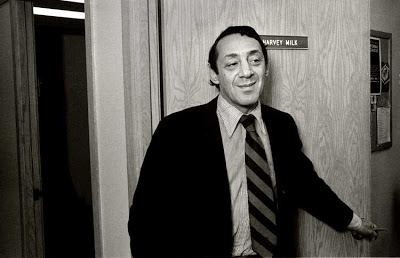 against whitewashing/mythologizing--on or off the silver screen--people that have sinned something terrible. Even those no longer with us. It's bad for future generations.
against whitewashing/mythologizing--on or off the silver screen--people that have sinned something terrible. Even those no longer with us. It's bad for future generations.As the ol' saying goes, "Those that do not learn the lessons of history are condemned to repeat them...."
".....Milk makes a rather unremarkable subject for the silver screen," writes Flynn, "In his seven years in San Francisco, he made four bids for elective office, only emerging victorious in his last—a 1977 run for city supervisor. For his persistence, Milk jokingly referred to himself as the 'gay Harold Stassen.' He served for less than a year.
In naming the onetime camera-shop proprietor one of the 100 most important people of the twentieth century, Time conceded, 'As a supervisor, Milk sponsored only two laws—predictably, one barring anti-gay discrimination, and, less so, a law forcing dog owners to clean pets’ messes from sidewalks.' Eleven months on the city council hardly seems the stuff of Hollywood legend.
So Hollywood invented a legend.
Rather than the gentle, soft-spoken idealist portrayed by Sean Penn, the real Harvey Milk was a short-tempered demagogue who cynically invented stories of victimhood to advance his political career. During his successful run for city supervisor, for instance, Milk’s camera store was the object of a glass-shattering attack by low-grade explosives.
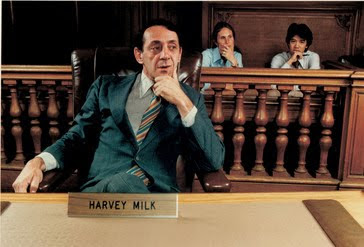 Milk blamed singer Anita Bryant, the outspoken opponent of gay-friendly legislation. 'Years later friends hinted broadly that Harvey had more than a little foreknowledge that the explosions would happen,' biographer Randy Shilts noted. One friend explained to Shilts: 'You gotta realize the campaign was sort of going slow, and, well...'
Milk blamed singer Anita Bryant, the outspoken opponent of gay-friendly legislation. 'Years later friends hinted broadly that Harvey had more than a little foreknowledge that the explosions would happen,' biographer Randy Shilts noted. One friend explained to Shilts: 'You gotta realize the campaign was sort of going slow, and, well...'The stunt would hardly have been the sole instance of Milk’s employing deceit to further his standing within the victimhood cult. In the upside-down world of San Francisco politics, Milk curried favor with voters by boasting that his homosexuality had resulted in a dishonorable discharge from the Navy in the dark ages before the sexual revolution. But far from the in-your-face, ponytailed 'Mayor of Castro Street' of the 1970s, Chief Petty Officer Milk of the 1950s was a closeted homosexual whose discharge papers reflected four years of honorable service.
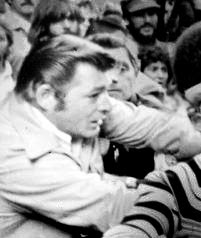 Milk was far more cavalier about the privacy of others than he was about his own. When Bill Sipple became a national hero for tackling gun-toting kook Sara Jane Moore before she could kill President Gerald Ford in 1975, Milk anonymously leaked news of the former Marine’s homosexuality to the media. 'It’s too good an opportunity,' Milk reasoned. 'For once we can show that gays do heroic things.' Just as Milk anticipated the 'outing' tactics of ACT-Up and Queer Nation, his rhetoric, too, foreshadowed the hyperbole of AIDS activists of the following decade.
Milk was far more cavalier about the privacy of others than he was about his own. When Bill Sipple became a national hero for tackling gun-toting kook Sara Jane Moore before she could kill President Gerald Ford in 1975, Milk anonymously leaked news of the former Marine’s homosexuality to the media. 'It’s too good an opportunity,' Milk reasoned. 'For once we can show that gays do heroic things.' Just as Milk anticipated the 'outing' tactics of ACT-Up and Queer Nation, his rhetoric, too, foreshadowed the hyperbole of AIDS activists of the following decade.Milk liberally tossed the 'Nazi' label at opponents of various gay-rights proposals and even compared politically moderate homosexuals to Nazi collaborators. 'We are not going to allow our rights to be taken away and then march with bowed heads into the gas chambers,' Milk proclaimed at 1978’s Gay Freedom Parade in San Francisco.
Such unflattering details made neither the final draft of the 'Harvey Milk Day' legislation nor the final cut of the Milk biopic. Milk’s cheerleaders are guilty of sins of omission and commission. What the film and legislation insinuate--in an effort to depict Milk as a martyr for the gay rights movement on par with Martin Luther King’s martyrdom for the Civil Rights movement--is that homophobia killed Harvey Milk on November 27, 1978.
But Harvey Milk’s homosexuality played about as much of a role in his murder as San Francisco mayor George Moscone’s heterosexuality played in his. Their murderer, troubled political neophyte Dan White, had donated $100 to defeat the Briggs Initiative, which would have empowered school boards to fire teachers for homosexuality. White hired a homosexual as his campaign manager and voted as a city supervisor to fund a Pride Center for homosexuals. White wasn’t driven to murder by Milk’s vision of gay rights but rather by something more pedestrian: the petty politics of City Hall. What makes for good history doesn’t always lend itself to good theater.
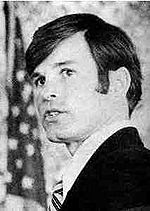 In a sign of the instability he would so dramatically display on November 27, a cash-strapped White had resigned his seat on the Board of Supervisors on November 10, only to demand four days later that the mayor reappoint him. Mayor Moscone publicly responded by saying that he still regarded White as a member of the board, handed back his letter of resignation, and promised him the seat.
In a sign of the instability he would so dramatically display on November 27, a cash-strapped White had resigned his seat on the Board of Supervisors on November 10, only to demand four days later that the mayor reappoint him. Mayor Moscone publicly responded by saying that he still regarded White as a member of the board, handed back his letter of resignation, and promised him the seat.Enter Harvey Milk, who saw White as an obstacle to progressive initiatives. As the movie depicts, Milk successfully lobbied Moscone to refuse to reseat the former policeman, fireman, and Vietnam veteran. Believing Milk and Moscone guilty of perfidy, the tightly wound, sore-loser White assassinated Moscone and then Milk.
Perhaps the most amazing historical detail of the murders of Harvey Milk and George Moscone is that their dramatic assassinations weren’t the biggest story to hit San Francisco in November of 1978. Bowdlerized from the Hollywood treatment is the role Harvey Milk played in the news story that eclipsed his own murder.
Nine days prior to Milk’s death, more than 900 followers of Jim Jones--many of them campaign workers for Milk--perished in the most ghastly set of murder-suicides in modern history. Before the congregants of the Peoples Temple drank Jim Jones’s deadly Kool-Aid, Harvey Milk and much of San Francisco’s ruling class had already figuratively imbibed.
Milk occasionally spoke at Jones’s San Francisco–based headquarters, promoted Jones through his newspaper columns, and defended the Peoples Temple from its growing legion of critics. Jones provided conscripted 'volunteers' for Milk’s campaigns to distribute leaflets by the tens of thousands. Milk returned the favor by abusing his position of public trust on behalf of Jones’s criminal endeavors.
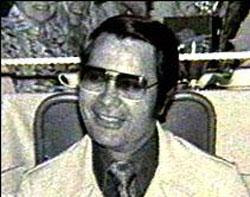 'Rev. Jones is widely known in the minority communities here and elsewhere as a man of the highest character, who has undertaken constructive remedies for social problems which have been amazing in their scope and effectiveness,' Supervisor Milk wrote President Jimmy Carter seven months before the Jonestown carnage. The purpose of Milk’s letter was to aid and abet his powerful supporter’s abduction of a six-year-old boy.
'Rev. Jones is widely known in the minority communities here and elsewhere as a man of the highest character, who has undertaken constructive remedies for social problems which have been amazing in their scope and effectiveness,' Supervisor Milk wrote President Jimmy Carter seven months before the Jonestown carnage. The purpose of Milk’s letter was to aid and abet his powerful supporter’s abduction of a six-year-old boy.Milk’s missive to the president prophetically continued: 'Not only is the life of a child at stake, who currently has loving and protective parents in the Rev. and Mrs. Jones, but our official relations with Guyana could stand to be jeopardized, to the potentially great embarrassment of our State Department.' John Stoen, the boy whose actual parents Milk libeled to the president as purveyors of 'bold-faced lies' and blackmail attempts, perished at Jonestown. This, the only remarkable episode in Milk’s brief tenure on the San Francisco board of supervisors, is swept under the rug by his hagiographers.

Sean Penn’s Harvey Milk is as real as Toby Maguire’s Spider-Man.
Who has time for the sordid details of purportedly staged hate crimes and boosterism of America’s most prolific mass murderer when there is a gay Martin Luther King to be mythologized? Even the fervent atheist Milk understood the need for patron saints. When confronted by a jaded supporter over his fabricated tale that the Navy had booted him out because of his sex life, Milk responded: 'Symbols. Symbols. Symbols.' He understood his movement better than his movement did.
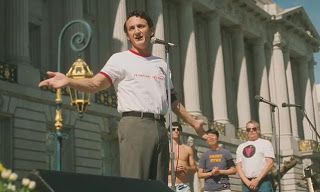 When the facts didn’t fit the script, both Milk and his present-day admirers adjusted the facts. As the elected sponsors of Harvey Milk Day realize, Californians are more likely to remember the celluloid hero they saw depicted by Sean Penn earlier this year than the obscure city official who walked largely unnoticed in their midst three decades ago.
When the facts didn’t fit the script, both Milk and his present-day admirers adjusted the facts. As the elected sponsors of Harvey Milk Day realize, Californians are more likely to remember the celluloid hero they saw depicted by Sean Penn earlier this year than the obscure city official who walked largely unnoticed in their midst three decades ago. The advocates of a Harvey Milk Day know box office. They don’t know the real Harvey Milk."
And the ones that did?
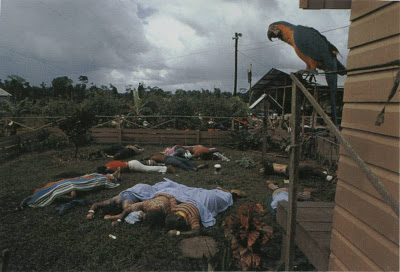
They're not talking.


2 comments:
So much we don't know. And so much that was known getting swept down the memory hole.
So true, Rose. That's why it's critical that the Freedom of Information law be employed to the fullest, as so frequently too many things are "overclassified." Take, for instance, the role the American Embassy in Guyana played throughout the Jonestown fiasco, from the time the first cultist "pioneer" set foot in that jungle to the moment the final body bag was tossed onto the flight to Delaware. As the saying goes, these State Dept./American Intel folks need to fess up once and for all "How much they knew--and when did they know it??" The depravities, the guns, the bribery of Guyanese ruling elite...and the monthly cynanide shipments into Father Jones's little hospital.
Post a Comment